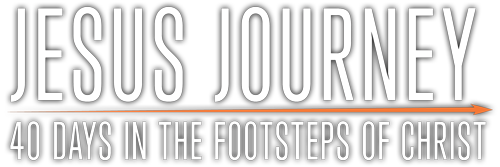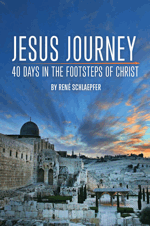Day 20
The Big Picture
Read Mark 12:15–34
Foreign visitors to Israel are often surprised that they’re expected to observe some of the traditional Jewish kosher laws, especially as they travel closer to Jerusalem.
For example, in order to stay kosher, most hotels there will not serve meat and dairy products at the same meal. I watched at one dinner while a young rabbi — who had
been strolling up and down our hotel dining room looking for violations — loudly upbraided a French tourist for smuggling in cream for her coffee.
Elevators and other electric appliances are often put on “Sabbath timers” so they automatically turn on and off without people having to risk breaking the Sabbath restriction against work by pushing a button.
Some tourists get frustrated. But I tell our church group that I hope they encounter some minor inconveniences like this. It helps them appreciate that they’re not in an American colony, but in a different country with different rules.
It also helps them relate, at least just a little bit, to one aspect of the first-century religious culture of Jesus.
RULES ABOUT RULES
Back in those days, there were rules about everything.
When you think of the Bible’s rules, you can probably think of about ten. The Ten Commandments.
But in Jesus’ time they thought of thousands.
The Pharisees decided that, since there were 613 letters in the Hebrew Ten Commandments, then there must be 613 sub-commandments that explained the Top Ten.
And since they counted 248 different parts of the human body, there must be 248 laws governing the human body.
Then all these laws had about 1,400 other “fence laws,” as they were called, added to them. These were designed to keep you from even getting close to breaking any of the other laws — that’s why they were “fence laws.” They were the rules about the rules!
THE UNANSWERABLE QUESTION
A popular activity in those days was for men to sit around discussing their religious rules day after day. They would have arguments about which rules were most important, and what the rules meant. They talked about the rules as fervently as baseball fans today might talk about the batting order of their favorite baseball team.
One day, some of them figured, let’s ask this Jesus guy a question about the rules that is impossible to answer.
“Of all the rules in our religion, what is the single most important rule?”
It’s the unsolvable equation. Because no matter what Jesus says, he’ll be seen as leaving some important rule out.
The gospels say this is one of a series of questions designed to trick Christ. See the trap? Whatever his answer is, it’ll ensnare him in controversy and get him off-message.
Great plan. Except they didn’t count on Jesus.
He replied:
“‘Love the Lord your God with all your heart and with all your soul and with all your mind.’ This is the first and greatest commandment. And the second is like it: ‘Love your neighbor as yourself.’” Matthew 22:37–39
Notice the order. You start with loving God. Then you love your neighbors.
People say we need to love our neighbors. Help people out. Do social justice. Feed the poor. Spread the gospel. And they’re right. Jesus said to.
But if you start there, without loving God first, eventually all that gets to be a burden. It becomes dry duty. Because it’s not the good news.
Start with God. Remember his love for you — the love of the God who made the universe and came to earth to rescue you! That’s the good news. It’s when you overflow with this, with a sense of his grace, that it spills onto other people.
THE LARGER STORY
Just give me the Cliff Notes on the Bible, Jesus. What does God really want from me?
A lot of people would summarize it this way:
Try harder!
Be a good boy or girl!
Behave, or you’ll make God mad!
Not Jesus.
He says, here it is: Love God. Love people.
Here’s how huge this is, Jesus says:
“All the Law and the Prophets hang on these two commandments.”
John Eldredge wrote a book called The Sacred Romance: Drawing Closer to the Heart of God that has helped many people rediscover these priorities.
He points out that many Christians, who want so badly to live a righteous life, instead end up burned out, spiritually stale, lax and lukewarm. They try real hard to do the right things. But they forget what it’s like to be in love with God.
They live in the “smaller story” of dos and don’ts instead of the “larger story” of the sacred romance.
See, if your summary of your religion is basically that God rewards me for my good behavior and punishes me for bad behavior, then you quickly move to a desire for an accurate scoring system — and the more precise the scoring system, the better. Exactly how do I earn brownie points with God? Exactly how many points is this worth? Exactly how do I get demerits?
In this answer to his critics, Jesus deftly points them away from their concerns with this smaller story and back to the larger story of God’s love.
What story are you focused on?
Prayer
Talk to God today about your “sacred romance” with him. Talk to him about the joys and struggles you have with that. Ask him for the courage to leave behind the “small story” and live in the grace of the “large story.”

 Buy Jesus Journey at Amazon.com
Buy Jesus Journey at Amazon.com